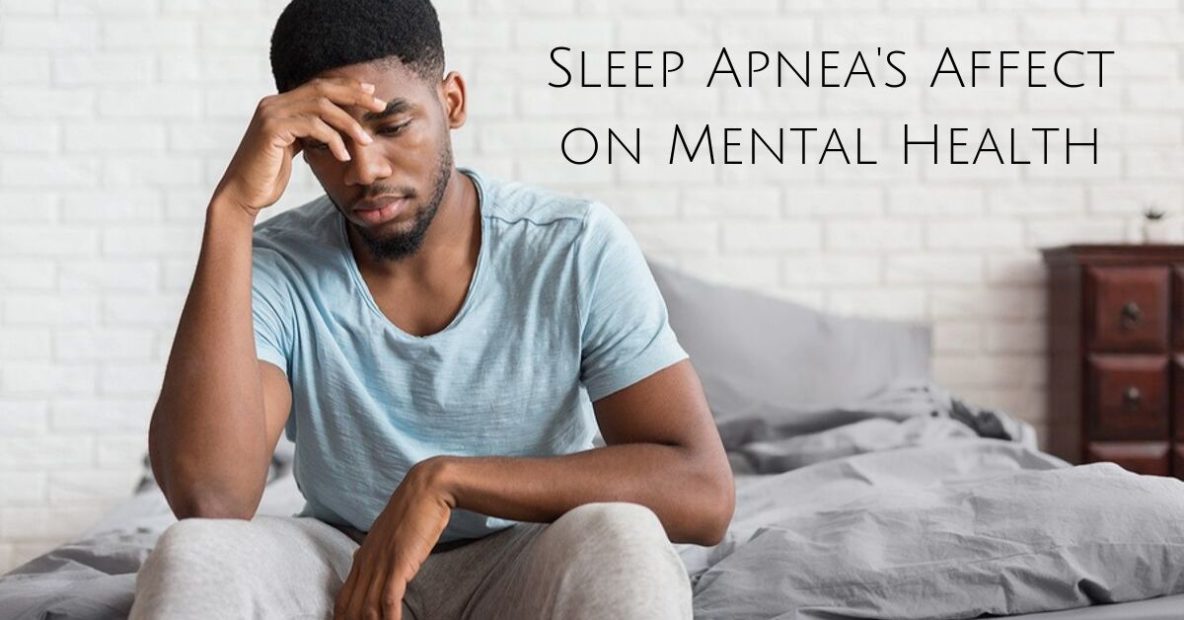Sleep Apnea’s Affect on Mental Health

- A Promising Paradigm Shift: New Research Challenges the CPAP-First Approach to OSA Treatment - September 5, 2023
- Understanding Sleep Meditation Techniques - July 30, 2021
- How Online Learning Has Affected Sleep for Students - July 13, 2021
Sleep apnea is hard to live with. You wake up tired and groggy every morning, and struggle to get through the day. When bedtime comes, you’re relieved to throw yourself into bed, but sleep apnea wakes you up repeatedly, and you can’t get the rest you need. Not only does sleep apnea affect your physical health and wellbeing, it also affects your mental health.
Sleep Apnea and the Brain
Sleep apnea affects the brain in profound ways. Along with causing fatigue, irritability, and difficulty focusing, sleep apnea impacts brain function, changing the structures and chemicals of the brain. This affects your daily life, making it harder to perform daily tasks, creating difficulty in thinking, and leading to memory problems.
Paul Macey, associate professor at UCLA in Los Angeles, looked at two chemicals associated with sleep apnea; glutamate and gamma-aminobutyric acid (GABA). They’re found in the brain region known as the insula, which is responsible for regulating emotions, assisting with rational thought, and even monitoring blood pressure and temperature. Glutamate is tied to your stress response, helping you respond to threats in the environment, while GABA is a mood inhibitor, and keeps you calm.
Those with sleep apnea has very high levels of glutamate, and far lower levels of GABA. When glutamate levels are high, you experience a lot of stress, and the brain doesn’t function well. The low GABA levels makes it harder for you to relax, rest, and recharge. This suggests that brain function changes with sleep apnea, and treating sleep disorders as soon as possible will help your brain function normally.
Sleep Apnea and Mental Health
Sleep apnea also has an effect on mental health, and those with sleep apnea have a far higher risk of anxiety, panic disorder, depression, bipolar disorder, or even schizophrenia.
It’s not surprising that sleep apnea can cause anxiety. Waking up repeatedly in the night feeling as if you’re choking or can’t breathe causes a stress response in the body and the brain. This can become a conditioned response, and go on to affect many areas of your life. Daytime drowsiness, along with irritability, leads to problems at work, difficulty focusing, and relationship stress. You’re likely to feel anxious as your life spins out of your control.
Depression and sleep apnea are linked as well. Those with depression often report trouble sleeping, and insomnia is one of the common symptoms of depression. In fact, several other symptoms of sleep apnea, such as fatigue, daytime exhaustion, moodiness, poor focus, and weight gain, are also signs of depression. Treating sleep apnea can reduce the symptoms of depression, and if you still have problems with mood after you’ve started treatment, you will need to seek treatment for your mental health as well.
Finally, asleep apnea has been tied to schizophrenia. Sleep apnea changes your brain, so it’s no wonder you might develop another brain related disorder. Those with schizophrenia are 6 times more likely to have sleep apnea, and just like depression, sleep apnea and schizophrenia share some similar symptoms such as daytime drowsiness and mood swings.
Sound Sleep Medical
Moderate to severe sleep apnea affects millions of Americans, leading to sleep disturbances and restless nights. Sleep apnea can cause up to 30 sleep disruptions per hour! You’ll have trouble concentrating on tasks, experience forgetfulness, have poor judgment, and may risk high stress levels and depression, as well as other more severe mental health struggles. Lack of sleep will change your brain, making it harder to get through the day and increasing your risk of a variety of health concerns.
If you have sleep apnea, get treated! Solid sleep is far more important than you realize, and once you experience the joy of waking up each morning feeling refreshed and ready for the day ahead, you’ll wish you’d treated your sleep apnea sooner. Oral appliance therapy is one treatment option for sleep apnea, and a great CPAP alternative. It will keep your airways open and allow you to sleep soundly throughout the night getting the rest that you need. Visit us at Sound Sleep Medical to assess your sleep patterns, find out if you have sleep apnea, and get the treatment you need to get back to sound sleep.
